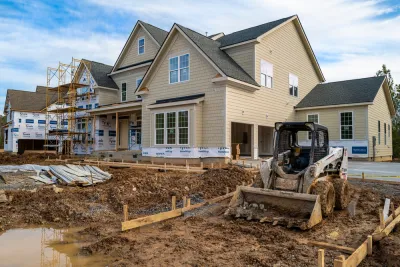Rather than providing incentives to lure employers to their cities, local leaders should focus on supporting enough affordable workforce housing to accommodate new and existing residents.

In a piece for the Philadelphia Citizen, Bruce Katz and Michael Saadine outline their ideas for “what forward-thinking localities can do to leverage housing as an economic development tool.”
The authors argue that although current market conditions should encourage developers to build new housing, “the litany of constraints on new construction across the country have made it ‘too hard’ to build new housing and ‘too easy’ to generate returns through lower-touch investments in housing.” This means investors are more likely to buy existing, fully occupied buildings rather than build new units.
“The concept of a starter home is disappearing. Our inability to build sufficient housing has made investors the most competitive buyers for much of the nation’s most affordable housing. We see yet another example of capital begetting capital in our system, with a lack of entry points for those who aspire to grow wealth from a lower baseline,” the authors write. Meanwhile, rental housing is becoming more expensive as owners profit from renovating older units and raising rents.
The article points to one example of a city that leveraged remote work to its advantage. “Tulsa, Oklahoma has a median home price that is 40 percent below that of the country overall. Though no one could have predicted the remote work wave brought on by Covid, Tulsa was forward-thinking on remote work at a time when most of us could not have imagined downtowns shuttered due to a pandemic.” In 2018, the city launched a remote work support program that drew over 1,200 new workers to the city. “While the program was not centered around housing, it paired an affordable market with an additional nudge to get ahead of what could be a massive economic wave for cities that were previously left behind.”
The article concludes, “Across the country, many metros that previously dedicated economic development resources to trying to lure employers with tax incentives would do well to think about their end consumer – residents – and how to create or maintain a housing market with enough supply to be affordable.”
FULL STORY: Affordable housing as economic development

Analysis: Cybertruck Fatality Rate Far Exceeds That of Ford Pinto
The Tesla Cybertruck was recalled seven times last year.

National Parks Layoffs Will Cause Communities to Lose Billions
Thousands of essential park workers were laid off this week, just before the busy spring break season.

Retro-silient?: America’s First “Eco-burb,” The Woodlands Turns 50
A master-planned community north of Houston offers lessons on green infrastructure and resilient design, but falls short of its founder’s lofty affordability and walkability goals.

Test News Post 1
This is a summary

Analysis: Cybertruck Fatality Rate Far Exceeds That of Ford Pinto
The Tesla Cybertruck was recalled seven times last year.

Test News Headline 46
Test for the image on the front page.
Urban Design for Planners 1: Software Tools
This six-course series explores essential urban design concepts using open source software and equips planners with the tools they need to participate fully in the urban design process.
Planning for Universal Design
Learn the tools for implementing Universal Design in planning regulations.
EMC Planning Group, Inc.
Planetizen
Planetizen
Mpact (formerly Rail~Volution)
Great Falls Development Authority, Inc.
HUDs Office of Policy Development and Research
NYU Wagner Graduate School of Public Service




























